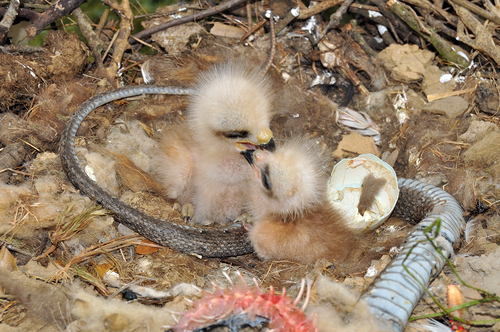Aggressive sibling competition for parental food resources is relatively infrequent in animals but highly prevalent and extreme among certain bird families, particularly accipitrid raptors (Accipitriformes). Intense broodmate aggression within this group is associated with a suite of traits including a large adult size, small broods, low provisioning rates, and slow development. In this study, phylogenetic comparative analyses are applied to assess the relative importance of several behavioral, morphological, life history, and ecological variables as predictors of the intensity of broodmate aggression in 65 species of accipitrid raptors. The study shows that intensity of aggression increases in species with lower parental effort (small clutch size and low provisioning rates), while size effects (adult body mass and length of nestling period) are unimportant. Intense aggression is more closely related to a slow life history pace (high adult survival coupled with a restrained parental effort), rather than a by?product of allometry or food limitation. Consideration of several ecological variables affecting prey abundance and availability reveals that certain lifestyles (e.g., breeding in aseasonal habitats or hunting for more agile prey) may slow a species' life history pace and favor the evolution of intense broodmate aggression. informacion[at]ebd.csic.es: Redondo et al (2019) Broodmate aggression and life history variation in accipitrid birds of prey. Ecol Evol https://doi.org/10.1002/ece3.5466
https://onlinelibrary.wiley.com/doi/full/10.1002/ece3.5466

 Las altas temperaturas están provocando que las lagunas y las marismas de Doñana pierdan agua rápidamente
Las altas temperaturas están provocando que las lagunas y las marismas de Doñana pierdan agua rápidamente




